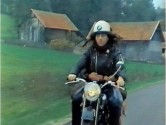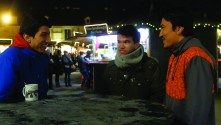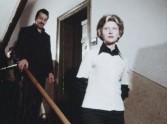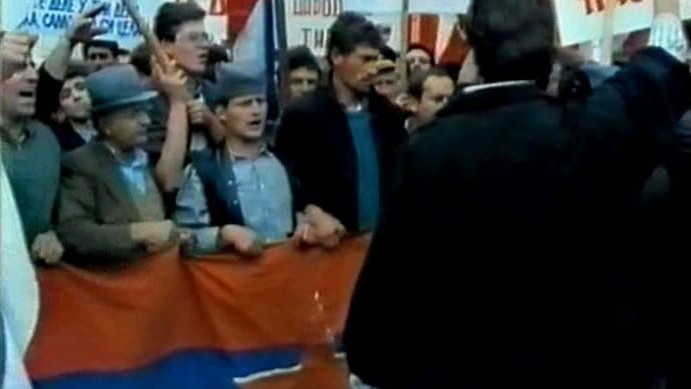
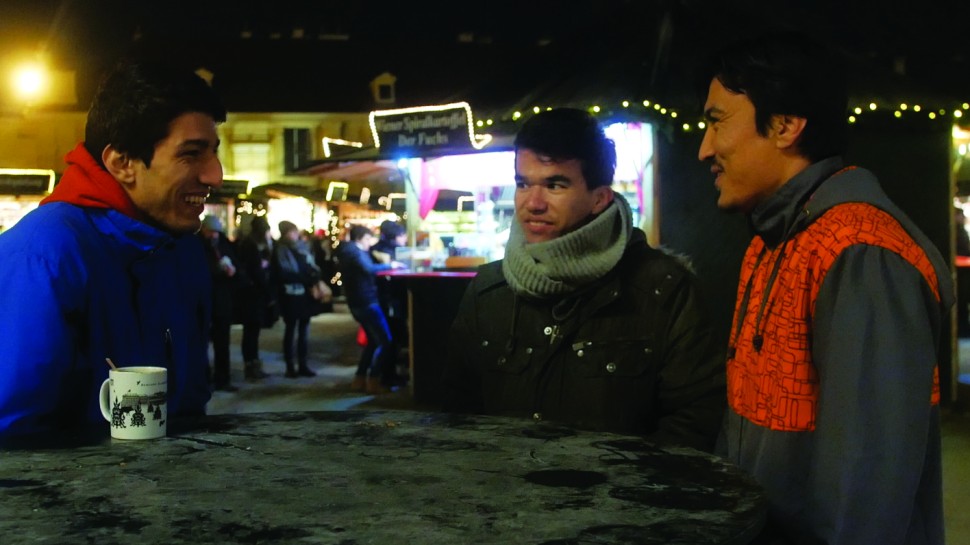
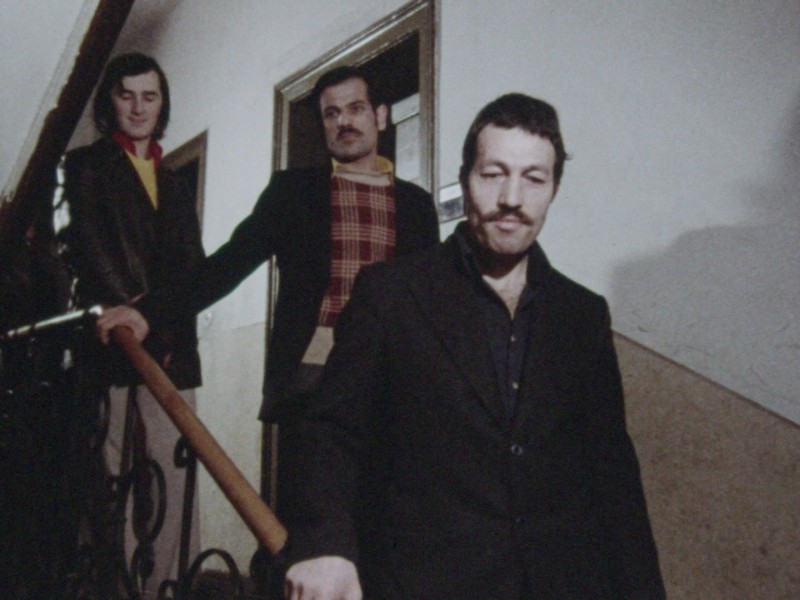

Filmmaker, Guest Worker: Zelimir Zilnik’s Expatriates
Long before the refugee crisis, indeed ever since the 1960s, the only true political combat in our countries has decisively revolved around the nomadic proletariat.
Improvisation, care, ruthless ideological critique: of the infinite throughlines one could extrapolate from the oeuvre of Zelimir Zilnik—whose still-expanding catalog totals over fifty-five films, around half of them features—one stands especially acute. Eighty-one years old and actively working on his next venture, Zilnik counts solidly among committed cinema’s strongest voices on migration, the diaspora and international trajectories of human labor. From his early years and Early Works (the title of Zilnik’s long-form debut, awarded the Golden Bear in 1969) to The Most Beautiful Country in the World (2018), the director has centered travel, expatriation and uprootedness as essential lenses through which one must look to understand social antagonism. Zilnik, argues scholar Pavle Levi, “is a persuaded transnationalist, an advocate of the political force—the community—composed of the oppressed, the marginalized and the excluded. His is the cinema of society’s inherent self-alterity: a cinema about the people whose lives embody a variety of European ideological contradictions, sociopolitical exclusions and paradoxes of identity formation. It is a cinema of Europe’s internal exiles.” At stake is an engaged artistic practice that takes itinerant lives not as spectacle, but rather as agents on whose individual destinies history takes shape. Globalization, emphasizes Zilnik, is an empty invocation if we fail to take heed of actually existing lives, of communities and persons made global: voluntarily, under duress and everything in between.
“I do not want to merely make films about guest workers; rather, as a guest worker myself, I would also like to learn something.” After six years of filmmaking in Yugoslavia—where his cinema, along with that of fellow Black Wavers, faced state repression—Zilnik emigrated to West Germany. In 1974, with the help of Vlada Majic as cinematographer and producer, the documentarist completed two films. Request is a single-take observation of an exchange between a Greek construction worker and a German lorry driver; in an exhibition of interethnic solidarity, the latter helps the former draft an official letter to the BRD authorities. Public Execution, meanwhile, dissects overviolent tactics used by the Bundespolizei, implicating mass media as accomplices and profiteers. While Request was thought to have been lost until 2020, Public Execution never received screening permission from the FSK, Germany’s cinema rating organization. The film—initially shot in color yet surviving only in a black-and-white working copy—remains unapproved for public exhibition in that country.
1975 was an inspired year, with Zilnik concocting five incendiary shorts in rapid succession. Abschied (Farewell), Hausordnung (House Orders) and Unter Denkmalschutz (Under the Protection of the State) were all likewise assumed lost until discovered in an archive very recently. Experiences and travails of former Yugoslav Gastarbeiter are highlighted in films as succinct as they are incisive. In Farewell, a Serb worker who spent five years at a Bavarian BMW factory bids goodbye to the country of his employment, using the final minutes before his train departure to show Zilnik’s camera the items he is bringing home: a vacuum cleaner (150 marks), an electric jig saw (50 marks), and some fabric for the kids. In House Orders, the director’s scope zooms out to offer a panoramic view of the intolerable living conditions of foreign workers, strapped and disciplined by house rules—both in their dilapidated apartment buildings and in German monoculture itself. To drive the point home, Under the Protection of the State takes the viewer on a guided tour of an aging residential complex whose owner (a high-ranking state MP) had the architecture classified as an historic-cultural landmark in order to avoid undertaking necessary repair and upkeep. If the dwelling is “under the protection of the state,” then its residents are under that state’s unlimited neglect, time and again subjected to violence, eviction threats and infringements of privacy. Here, Zilnik occupies the subject position of a witness, listening attentively to the testimonies of his subjects. At times, the director interjects, drawing attention to his presence; yet these appearances are infrequent, as the action generally unfolds with minimal editing, no extradiegetic sound, and in an unbroken time and space.
Unlike most of Zilnik’s 70s shorts, Inventur – Metzstraße 11 (Inventory) has circulated widely. In this nine-minute tour de force, an immobile camera at the bottom of a staircase at the eponymous Munich address takes stock of around three dozen tenants that call the apartment building home. (Incidentally, Metzstraße 11 lies only a block away from where Rainer Werner Fassbinder shot Angst essen Seele auf (Ali: Fear Eats the Soul) a year earlier.) Each inhabitant descends the stairway at their own pace and introduces themselves in a language of their choosing: German is heard often, yet so is Italian, Greek, Turkish and Serbo-Croatian. Zilnik’s gaze is static and deceptively bureaucratic, with subjects captured one after another as if on an administrative conveyor belt. Yet the approach betrays warmth and intimacy, as the denizens’ individual approaches—some opting to state only raw facts (name, age, country of origin), others spilling out their deep existential concerns—testify to the trust, openness and collective freedom that Zilnik’s act of filming instantiates. The seven-film program of West German shorts is closed out by I Do Not Know What That Should Mean, in which Zilnik collages idyllic landscapes with scenes of elderly men and schoolkids reciting Heine’s “Die Lorelei.” Issues of national belonging, cultural atavism, and Germany after Hitler come to the fore in a film as silently understated as it is subversively ironic.
In 1976, Zilnik left the Federal Republic abruptly. After the inaugural showing of Paradies: Eine imperialistische Tragikomödie (Paradise: An Imperialist Tragicomedy), the police visited the filmmaker, arresting him alongside cameraman Andrej Popović on invented allegations of tax fraud. With the help of Filmverlag der Autoren president Alexander Kluge, charges against the two were dropped on condition that they depart the FRG within twelve hours. Doing exactly that, Zilnik found himself rapidly expulsed again, this time to the country he already once exited. In Yugoslavia, circumstances for his type of independent documentary were not ideal. “Several years after my return home, I had in mind the Western European practice of creating for television, so I contacted Television Novi Sad. The main reason I did this, however, was the fact that I saw that all the other production doors were closed to me.” Finding shelter under the roof of public broadcasters, Zilnik entered what is now understood to be an exceptionally rich decade of invention and experiment. Of the around twenty films he executed between 1977 and 1990, we will show only two: Druga generacija (The Second Generation, 1984), in which immigrant experiences are recounted from the perspective of expat teenagers, and Stara mašina (Oldtimer, 1989), one of film history’s most incisive and darkly prophetic diagnoses of the turmoil enveloping late Yugoslavia.
Initially a TV film, The Second Generation started life as The First Trimester of Pavle Hromis (Prvo tromesecje Pavla Hromisa), finished and broadcast in 1983. After the latter’s excellent reception, Zilnik was approached by a Belgrade production company and tasked to transform the work into a narrative fiction. The end result was The Second Generation, an 87-minute hybrid documentary that travelled Yugoslav, Hungarian, Polish and Czechoslovak small screens in what was then an excitingly elaborate network of international distribution. Shot on 16-millimeter, the film follows schoolkids—children of ex-Yugoslavs in Germany, Australia, Austria and Canada—in their “return” to an anything but homey homeland. Unsurprisingly, the teens encounter issues fitting into an educational environment that to them appears alien, or at best ambivalent. “I don’t know any of this … I have no idea what to do,” one adolescent born and raised in Melbourne laments during a high school exam on the essentials of socialist theory. “Well, over there they have capitalism, so there are no Marxist studies at all.”
One of Zilnik’s sharpest takes on identity under globalization (as well as one of his most driving soundtracks), The Second Generation involves two important threads. First is the director’s abiding interest in narrative, fictionalization, scripting and reenactment, which has carried through to his most recent semi-observational endeavors. Here, Zilnik’s experiments approximate the thought of Cesare Zavattini, another giant of film realism. “People understand themselves better than the social fabric,” wrote the Italian in 1953. “And to see themselves on the screen, performing their daily actions—remembering that to see oneself gives one the sense of being unlike oneself, like hearing one’s own voice on the radio—can help them to fill up a void, a lack of knowledge of reality.” Second is Zilnik’s incessant struggle to expand and diversify the assortment of sites at which contemporary migration is understood to occur. On top of venturing to heavily policed borders (such as in Fortress Europe), refugee encampments just outside the EU (Logbook Serbistan), and the asylum centers of Western Europe (The Most Beautiful Country in the World), Zilnik is also an indispensable auditor of spaces in which human flow manifests less visibly. Internal and informal displacement, second generation returnees, subjects stuck between two or more identities, states, authorities: these too are of first-order importance to a filmmaker whose opus is an extended argument for reading global migration as the political issue of our time. Guest work, emphasizes Zilnik, is not a phenomenon of the elsewhere, taking place outside the everyday here and now. It is instead a feature of innumerable human lives—in historical communism and in financial capitalism, at home and far abroad.
Oldtimer is one example of Zilnik shifting gears to depict unusual migratory roads. After an altercation with his editor, Igor—a thirty-something radio host and journalist—departs hometown Ljubljana in search of respite in Greece. He embarks on his old-timer DKW motorcycle, traversing Croatia, Bosnia and Serbia; there, he inadvertently slips into the vortex of “anti-bureaucratic” nationalist protests, organized in support of Slobodan Milošević. The dissolution of former Yugoslavia was still two years away, yet Igor could sense extreme ethnoparticularism in the air. “The war hasn’t started yet, but it is better to be prepared,” he exclaims upon exiting the country. A work of fiction that hits close to home (clearheadedly denouncing the terror these immense gatherings would soon turn into), Oldtimer is at the same time one of Zilnik’s several road movies. Taking place on highways and domestic side alleys, the film expertly investigates emigration as the augury of future Yugoslavia, with over four million having to leave their home in the 1990s.
In his recent docufictions, Zilnik has kept pace with new waves of intercontinental movement. The director’s latest two projects—Logbook Serbistan (2015) and The Most Beautiful Country in the World (2018)—take place on the Balkan refugee route and in Austrian undocumented communities respectively, each charting a particular phase in the itinerary of migrants from North Africa and Asia. While Logbook chronicles asylum seekers as they enter and exit Serbia, The Most Beautiful Country indicates that agonies are far from over when reaching EU safe zones. “In that respect,” as Natasa Kovacevic writes, “it comes across as a follow-up to Logbook … As usual, Zilnik avoids sentimentality and pathos in favor of following his protagonists as they engage in quotidian activities: renting an apartment, learning German, singing, practicing judo and visiting a Christmas market.” It is imperative to mention that the titular “most beautiful country” is misleading: Afghanistan, not Austria, is the area in question according to protagonists Bagher and Haidar.
Across five screenings, Zilnik offers us a comprehensive spectrum of vantages, sites and trajectories. After his initial sojourn as cineaste-Gastarbeiter in the FRG, he reported on second-gen children returning “home,” internal émigrés scouting Yugoslavia on old timers, exiles stuck in the thickets outside Schengen, and residency applicants after arriving in Western Europe. Five viewpoints and directions, an entire diapason of aspiration and (im)possibility. To this, the series adds For Ella (1997), Zilnik’s ten-minute skit about an aging jazz pianist who is unable to stop playing after hearing of Ella Fitzgerald’s death on the TV. His wife—“I need money, not music!”— ultimately throws him and the instrument out of their Novi Sad apartment, leaving the anguished, grieving musician to play Ella on the street during a rainstorm. Another historical tragedy, another instance of expulsion, this time intimate, local, and absurd.
“Zilnik’s oeuvre is a map of detours, well-trodden historical paths, circular roads that reveal history repeating itself, and the odd escape route,” argues Olaf Möller. “In Zilnik’s films, migration is both necessity and plight … The more he has become a cinematic migrant worker, a nomad of the visible, the more he has learned to travel light.” Arriving to the Harvard Film Archive in early November, Zilnik will be accompanied on a North American tour by his producer and partner Sarita Matijevic and by programmer and scholar Greg de Cuir Jr. The event marks Zilnik’s second time among Cambridge audiences, the first since 2017. In the intervening years, everything and nothing has changed, both in cinema, migration and the world; there is scarcely a readier encyclopedic critic to direct us through the ruptures than Zelimir Zilnik on screen and in person. – Nace Zavrl, doctoral candidate in the Department of Art, Film, and Visual Studies, Harvard

